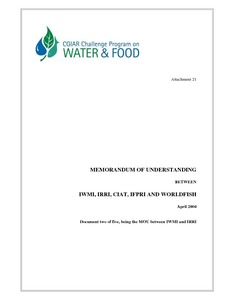Resource information
In the months since approval in November 2002, the Challenge Program on Water and Food
(CPWF) has evolved at a tremendous pace. Much has been achieved. Governance, management, personnel and procedures are in place and operational. The first call for proposals under the competitive mechanism for contracting was developed and undertaken. As a result, 21 projects are under negotiation from among 50 approved projects available for support. While the donor base is expanding with the EC, DfID and IFAD showing strong interest in joining our current supporters (the World Bank, Netherlands, France, Switzerland, Germany, Denmark, Norway and Sweden), more funding is vital to maintain the reputation and reap the potential of the CPWF. Awareness of the program has been raised through a very successful Baseline Conference in Nairobi and informative written materials and media events. These activities have strengthened the research ‘community of practice’ being built around the CPWF themes and benchmark basins and helped inform public opinion. Monitoring and evaluation systems for all aspects of the program are under development. Contract documentation has been developed that is supportive of the collaborative approach to research management and implementation that the CPWF promotes. Extensive ground work for an integrated data sharing network has been developed and is being taken forward in 2004. The CPWF catalyzed further discussion on an agreed set of global indicators for river basin assessments through a workshop at the Nairobi Conference as one of a number of initiatives to link itself to global change research networks. A capacity building program continues to be developed aimed at the increased involvement of NARES partners, including strengthening their capability to identify key research and development needs, and to have the confidence and ability to articulate those demands. The twin goals of the program are the improvement of water productivity in food production and the reform of research management in the CGIAR. CPWF activities have been guided by a 19 member consortium of partners whose representatives constitute the Consortium Steering Committee. All consortium partners have signed a Joint Venture Agreement that defines their responsibilities. The Steering Committee operates autonomously from the Board of IWMI (the CPWF lead member) with no reporting obligations.
The year has seen the maturation and consolidation of the Steering Committee, working together to provide oversight to the program activities. Similarly, members of the Challenge Program Management Team (CPMT) have worked collectively to formulate program-wide procedures and activities, set priorities, promote the program, and develop individual output-based work plans. The CPMT continues to broaden and share team responsibilities under the guidance of the Coordinator, including those to guide decisions for future research and procedures. This has involved analysis of questionnaire responses about experiences of participants in the first competitive call, a ‘gap analysis’ and harmonization and rationalization of research priorities through construction of a ‘concordance’. The CPWF represents the largest, most comprehensive investment in the world on water, food and environment research. Through the paradigm of water productivity, it offers a new approach to natural resources management research within the CGIAR. It also has broad influence on the way a wide range of institutions conduct research in this area, work together in partnerships and seek meaningful impact for research users.


